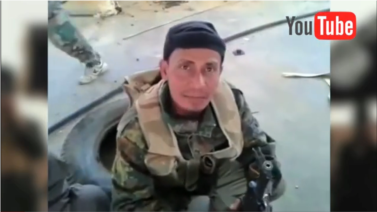The last major terrorist attack in Indonesia happened in 2009. At the time, militants bombed two hotels in Jakarta.
Since then, the Indonesian government has reduced terrorist threats by capturing, not killing, terrorist leaders such as clergyman Abu Bakar Bashir. His trial – and others – helped turn public opinion against violent militants.
But the terrorist threat in Indonesia returned this year. Recently, an online video showed an Indonesian man who claimed to be an Islamic State fighter in Syria. He called on Muslims to rise up against the government in Jakarta. The video showed many Indonesians their own war against terrorism is not over.
Sidney Jones is with the Institute for Policy Analysis of Conflict in Jakarta. She calls the video a wake-up call.
"The Indonesians for the first time saw the Islamic State as a challenge to Indonesian sovereignty. That's what triggered the reaction. It wasn't that all of a sudden it became more dangerous.”
Counter-terrorism strategies
Indonesian police arrested several local Islamic State supporters after the video was released. Police may charge them with inciting unrest in a friendly foreign state.
Officials may also seize the passports of about 150 Indonesians who have joined the Islamic State in Syria.
Some human rights groups are concerned about how the police have answered the video. They say the measures have been too strong, and that citizens have not been able to examine the police action.
But the Indonesian government is not changing its counter-terrorism policy. The government said it will continue to use police and lawyers to reduce terrorism.
Some Islamic leaders also have suggested blocking foreign groups from providing money to religious education in Indonesia. Such a ban would include Muslim and Christian organizations.
Sidney Jones of the Institute for Policy Analysis of Conflict says more Indonesian Muslims are using social media to speak against the extreme violence of the Islamic State. She says most Muslims in Indonesia are surprised and concerned about what the Islamic State is doing.
“One of the interesting things about the emergence of the Islamic State is how horrified most mainstream Muslims are in Indonesia.”
Outside Jakarta, the Indonesian government is paying for programs opposed to extremist Islamic beliefs. At the al-Hikam boarding school, young Indonesian men are learning moderate Muslim teachings.
Arif Zamhari is the director the program.
"We spread a virus of peaceful Islam to, you know, to community here. The problem here, because, the loudest voices are from the radicals, so our moderate, moderate groups never speak out.”
Arif Zamhari says the newly-trained religious leaders will speak in mosques across the country.
I’m Kelly Jean Kelly.
Brian Padden reported this story from Jakarta. Kelly Jean Kelly adapted it for Learning English. Caty Weaver was the editor.
Words in This Story
wake-up call – n. something that makes you fully understand a problem, danger or need
counter-terrorism – adj. done to prevent terrorist attacks and destroy terrorist networks
emergence - n. becoming known or coming into view
horrified – adj. greatly upset and shocked
mainstream – adj. accepted by the largest number of people

